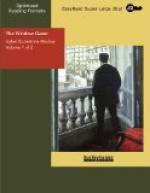“’As to what the world is coming to in the matter of domestic service,’” writes Aunt Caroline, “I do not know. I do not wish to worry you, Benis, but as you will be marrying some day, in spite of that silly doctor of yours who insists that it’s not to be thought of, you may as well be conversant with the situation. To put it briefly—/ have been without competent help for two weeks. You know, dear boy, that I am easily satisfied. I expect very little from anyone. But I think that I am entitled to prompt and willing service. That, at the very least! Yet I must tell you that Mabel, my cook, has left me most ungratefully after only three months’ notice! She is to be married to Bob Summers, the plumber. (Lieutenant Robert Summers, since the war, if you please!) Well, she can never say I did not warn her. I did not mince matters. I told her exactly what married life is, and why I have never tried it. But the foolish girl is beyond advice. I have had two cooks since Mabel, but one insisted upon whistling in the kitchen and the other served omelette made with one egg. My wants are trifling, as you know, but one cannot abrogate all personal dignity—’
“Do you get the subtle connection between the one egg and Aunt Caroline’s personal dignity?” asked Spence with anxiety. “Because if you don’t, I’ll never be able to ask you to live in Bainbridge. I may as well confess now that it was only my serene confidence in your sense of humor which permitted me to marry you at all. I should never have dared to offer Aunt Caroline as an ‘in-law’ to anyone who couldn’t see a joke.”
“You are very fond of her all the same,” said Desire shrewdly. “And though she expects very little from anyone, she evidently adores you. She can’t be all funny. There must be an Aunt Caroline, deep down, that is not funny at all. I think I’m rather afraid of her. Only you have so often said that she wished you to get married—”
“Excuse me, my dear. What I said was, ’Aunt Caroline wished to get me married.’ The position of the infinitive is the important thing. Aunt Caroline never intended me to do it all by myself.”
“Oh. Then, in that case, she may resent your having done it.”
“Resent,” cheerfully, “is a feeble word. It doesn’t express Aunt Caroline at all.”
“You take it calmly.”
“Well, you see I’ve got you to fight for me now.”
They looked at each other over the empty coffee cups and laughed.
It is easy to laugh on a fine morning. But if they had known where Aunt Caroline was at that moment—how-ever, they didn’t.
“Once,” said Spence “my Aunt read a book upon Eugenics. I don’t know how it happened. It was one of those inexplicable events for which no one can account. It made a deep impression. She has studied me ever since with a view to scientific matrimony. Alas, my poor relative!”
“I once read a book upon Eugenics, too,” said Desire with a reminiscent smile. “It seemed sensible. Of course I was not personally interested and that always makes a difference. One thing occurred to me, though—it didn’t seem to give Nature credit for much judgment.”




